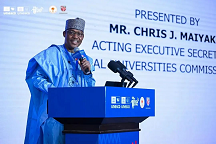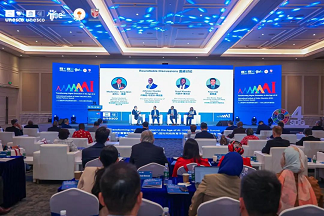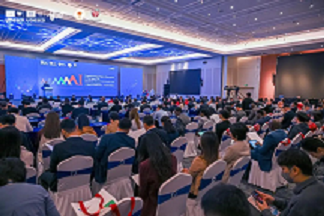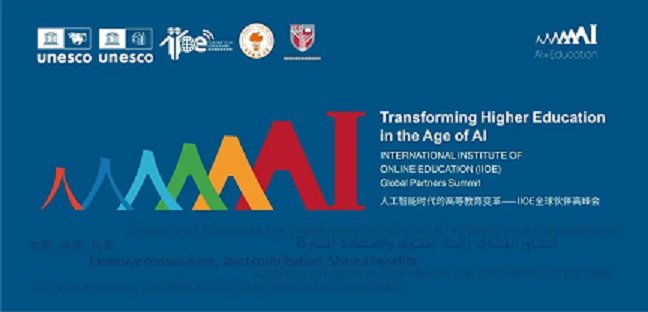|
The IIOE Global Partner Summit on
Higher Education Transformation in the Era of Artificial Intelligence Opened in
Shenzhen
Original UNESCO ICHEI 2023-12-07
23:54 Published in Guangdong
Artificial intelligence has
brought new opportunities to higher education, but also challenges such as
academic integrity risks, technological abuse, and the deepening digital
divide. Based on this background, from December 7th to 9th, 2023, under the
guidance of the Secretariat of the National Committee for UNESCO in China, the
IIOE Global Partnership Summit on "Higher Education Transformation in the
Era of Artificial Intelligence" was organized by the UNESCO Institute of
Educational Information Technology (IITE), the UNESCO Center for Higher
Education Innovation (Shenzhen, China), Southern University of Science and
Technology In 2023, the IIOE rotating chairman unit, the University of Botra
Malaysia, jointly hosted the event at Southern University of Science and
Technology.
The summit invites global
education leaders, policy makers, experts and scholars, business institutions
and other stakeholders in higher education to fully share and discuss topics
such as the new opportunities brought by artificial intelligence to higher education,
how artificial intelligence drives university management, opens up channels for
teacher professional development, and how to effectively govern. About 90
overseas guests and over 100 Chinese guests from 28 countries in Asia, Africa,
Latin America, the Arab region, and Europe attended the conference, including
influential higher education leaders such as officials from multiple education
ministries, principals and vice principals of higher education institutions,
and international experts.
This summit includes seven forum
topics, namely higher education governance, higher education teacher career
development, micro certificates and university teacher career development,
university teaching innovation and practice, university management,
high-quality digital content, and innovative partnerships. The summit actively
advocates for the common goal of "effective integration of higher
education and artificial intelligence", and shares and discusses topics
such as artificial intelligence technology governance, industry education
integration, policy framework, and case sharing, jointly looking forward to the
transformative impact of good governance of artificial intelligence technology
on higher education. The summit aims to share case studies and best practices
from global partners; Share the applications of artificial intelligence in the
field of education, such as IIOE AI laboratories and iTA intelligent teaching
assistants for generative artificial intelligence, build a cooperation platform
between IIOE partner universities and artificial intelligence service
providers, and promote industry university cooperation; Release the White Paper
on Higher Education in the Era of Artificial Intelligence (Draft for Comments).
The summit is committed to building a multilateral platform for dialogue and
exchange among governments, universities, and enterprises of various countries,
promoting the sharing of international resources and local innovation
experiences among stakeholders, and jointly building a digital transformation
ecosystem for higher education.
IIOE Global Partner Network
Leading
Digital transformation of higher
education
On the morning of December 7th,
the summit held its opening ceremony, keynote speech, and forum on "Higher
Education Governance in the Era of Artificial Intelligence". The opening
ceremony was delivered by Zhan Tao, Director of UNESCO IITE, Co organizer of
the conference, and Jin Li, Director of the Innovation Center and Vice
President of Southern University of Science and Technology.
Director Zhan Tao stated that
UNESCO's mission is to guide the direction of higher education in the AI era,
bridge the digital divide, and uphold the responsibility and responsibility of
technological governance. There is no standard answer regarding the impact of
AI on higher education; The summit provides a broad platform for communication
and dialogue among all parties, which helps to gather the strength and wisdom
of all parties. The global partnership network built by innovation centers
plays an important leading role in the digital transformation and innovation of
higher education in developing countries.
Professor Jin Li, Director of the
Innovation Center and Vice President of Southern University of Science and
Technology, stated that the International Institute of Online Education (IIOE)
will further expand its global partnership alliance, increase public-private cooperation
and industry university integration, and continue to lead the digital
transformation of global higher education in the future. Since its
establishment, IIOE has established ten IIOE national centers in the past four
years to jointly build inclusive and high-quality higher education at the
national and local levels, expand the network of partner universities from
point to surface, and create a global digital higher education system. In
addition, the Innovation Center has deployed smart classrooms in more than 40
countries around the world, enhancing the construction of smart infrastructure
in developing country universities and building an important platform for
industry university cooperation.
Keynote speech
The keynote speech was hosted by
Mr. Firmin Edouard Matoko, Global Strategy Advisor of the Innovation Center and
former Assistant Director General of Africa Priority and External Relations at
UNESCO. Mr. Matoko evaluated the significance and cultural significance of new
technologies for the global transformation of higher education in the South.
With the rapid development of technology in the past decade, one-third of the
population in Africa is using digital technology to provide online and distance
education. Will human thinking abilities gradually deteriorate in the future
due to robots and algorithms? The responsibility of UNESCO is to regulate the
use of artificial intelligence technology and promote the transformation of
higher education in developing countries. In addition, higher education should
be prepared for the new generation and how to better utilize new artificial
intelligence technologies. More importantly, technology should adapt to local
cultures in different countries and better empower higher education.
Dragan Gasevic, Distinguished
Learning Analysis Professor at the School of Information Technology at Monash
University in Australia, discussed the opportunities and challenges of
artificial intelligence. On the one hand, the application prospects of
artificial intelligence in higher education are very broad. Generative
artificial intelligence technology relies on the Large Language Model (LLM),
which can support teacher teaching and rebuild the evaluation system of higher
education. However, at the same time, artificial intelligence still has many
limitations in terms of the effectiveness and accuracy of content production,
ethical ethics, technological fairness, and accessibility. Therefore, he called
for a more comprehensive and in-depth understanding and use of artificial intelligence;
We should proactively create AI that meets human needs, rather than letting
technology develop irregularly.
Zheng Nanning, a member of the
International Association of Electrical and Electronic Engineers and an
academician of the CAE Member, pointed out that AI enabling education is
redefining the value of human knowledge and ability. Education is a slow and
elegant process that moistens things silently; No matter how advanced AI
technology is, machines cannot replace human emotions and imagination, let
alone spiritual communication and intellectual enlightenment between teachers
and students. The most important thing is that teachers need to make good use
of artificial intelligence technology to cultivate and stimulate the creativity
of learners. In order to better adapt to "human-machine collaborative
intelligent education" and standardize the management and use of
artificial intelligence technology, governments and UNESCO play important roles
in governance.
Dr. Ma Yanjun, General Manager of
Baidu AI Technology Ecology and Joint Leader of the National Artificial
Intelligence Standardization Group's Large Model Special Group, shared the
integration of industry and education under the trend of large models. Given
that enterprises can provide practical content related to educational
technology, cooperation between enterprises and universities can help promote
the integration of AI technology and higher education. Enterprises need to
closely integrate with teachers, students, and universities to improve the
efficiency of teaching, research, and management work. Baidu and the Innovation
Center have accumulated important cooperation achievements such as micro
certificates, and will jointly expand their partner network in the future,
deepen cooperation with universities in more countries and regions, and inject
new vitality into the digital transformation ecosystem of higher education.
Forum 1: Global Education Leaders
Co discuss higher education
governance
Forum One "Higher Education
Governance in the Era of Artificial Intelligence" is chaired by Mr. Tang
Qian, former Assistant Director General of Education at UNESCO. Mr. Tang Qian
pointed out that the rise of artificial intelligence has driven the development
of global higher education, and UNESCO actively responds to challenges and
seizes opportunities. At the same time, artificial intelligence has brought new
challenges and opportunities to the education industry and UNESCO, which also
points the way for future development. I hope that this forum can continue to
pay attention to and support the application of artificial intelligence in the
field of higher education, and contribute to the innovation and progress of
global higher education.
Zhu Zhiting, a lifelong professor
at East China Normal University and a special advisor to the UNESCO Higher
Education Innovation Center, emphasized that "the only constant in the
world is change" with the topic of "Artificial Intelligence and
Ethics in Universities". In the era of accelerated transformation in
artificial intelligence, the development of LLM is not the end of human
exploration, but a new starting point, and more new ideas will emerge in the
future. In addition, he puts forward the following five suggestions for the
ethical construction of artificial intelligence in higher education: adhering
to the concept and practice of humanism; Establish a framework for ethical
governance in higher education through the penetration of artificial
intelligence; Establish a policy education framework for artificial
intelligence in higher education; Carry out micro professional/micro
certificate education on artificial intelligence literacy and related ethics;
Higher education should contribute to the construction of an artificial intelligence
ethical system that promotes mutual benefit between humans and technology.
Professor Mona Abdel Al Elzahry,
Executive Director of the Education Strategy Management Bureau at Ain Shams
University in Egypt, shared the effective governance framework and practices
for implementing AI in the higher education system in Egypt. She emphasized
that with the continuous development of the potential for higher transformation
in artificial intelligence, educators should maintain an open and critical attitude
towards it, ensuring that its application conforms to ethical considerations
and promotes overall well-being.
Chris Maiyaki, Acting Executive
Secretary General of the National University Council of Nigeria, shared key
initiatives of the Council to promote higher education reform and leadership
development through innovative partnerships. Mr. Maiyaki emphasized the
potential exacerbation of the digital divide in the context of digitalization,
as well as the instability of digital technology application prospects faced by
universities in developing countries. In this context, innovative and
sustainable partnerships between universities, governments, and enterprises
will effectively respond to rapid social changes, providing new paths for
university curriculum design, creating new knowledge, and cultivating talents
that meet future social needs from the perspective of mutual assistance and
trust.
Dr. Bi Xin, Chief Digital Officer
and Director of the Knowledge and Information Center at Xi'an Jiaotong Liverpool
University in China (hereinafter referred to as "Xipu"), shared
Xipu's journey in digitalization of higher education. As a partner of the
Innovation Center, Xipu actively responds to UNESCO Sustainable Development
Goal 4 by building a learning supermarket platform, promoting lifelong learning
through shared resources, systems, and infrastructure, enabling more teachers
and students to benefit from education, and looking forward to collaborating
with more overseas partners.
Round table discussion
Mr. Tang Qian had a roundtable
discussion with President Johnson Nyarko Boampong, Secretary General Yusuf
Kiranda, Vice President Kean Tak, and other experts on how to address the
challenges brought by AI to higher education.
Johnson Nyarko Boampong
President of Cape Coast University
of Ghana
Universities face digital
challenges and limitations in cultivating technical talents when using AI,
requiring the establishment of technical global partnerships and investment in
local AI development.
Yusuf Kiranda
Secretary General of Markre
University in Uganda
AI technology is developing
rapidly, but governance is relatively lagging behind, and legal regulations and
policy guarantees need to be followed up in a timely manner.
Kean Tak
Vice President of the Royal
University of Phnom Penh, Cambodia
The infrastructure and teaching
resources of universities in developing countries are limited, and AI has
enormous potential for the development of the abilities of faculty and
students. However, at the same time, it is also necessary to address potential
issues from an international cooperation perspective.
IIOE Alliance Promotion
Integration of AI and Higher
Education
In December 2019, the Innovation
Center teamed up with Southern University of Science and Technology to jointly
launch the establishment of IIOE, in collaboration with global universities and
enterprises. In 2020, against the unique historical background of the global
pandemic, the IIOE platform helped universities and teachers in developing countries
urgently respond to the challenge of offline suspension of classes. It
organized targeted multilingual online courses and training, covering content
such as cloud computing, big data, the Internet of Things, and artificial
intelligence. Since the establishment of the project, IIOE has adhered to the
concept of "consultation, co construction, and sharing", and has
cooperated with universities, enterprises, international organizations, and
other relevant parties at multiple levels and multilateral levels to jointly
build a global ecosystem to promote the digital transformation of higher
education. The four rotating chairman units have provided strong support to
IIOE, and ten IIOE national centers have played a "point to area"
regional radiation effect, driving more local universities to join the IIOE
alliance. After more than three years of development, the IIOE alliance covers
nearly 90 partner universities and various business partners, empowering more
than 10000 teachers in 135 countries worldwide, and is committed to becoming a
leader in the digital transformation of global higher education.
During the three-day conference,
the Innovation Center will continue to explore opportunities, mechanisms,
risks, governance, and support for the integration of AI and higher education.
This summit focuses on the theme of "The Transformation of Higher
Education in the Era of Artificial Intelligence" and conducts in-depth
discussions and multilateral exchanges, further exploring the practical path of
the integration of AI and higher education. This summit is committed to
consolidating the power of global multilateral cooperation and opening a new
chapter for innovation centers and global partners to reshape the future of
higher education in the AI era.

 

|